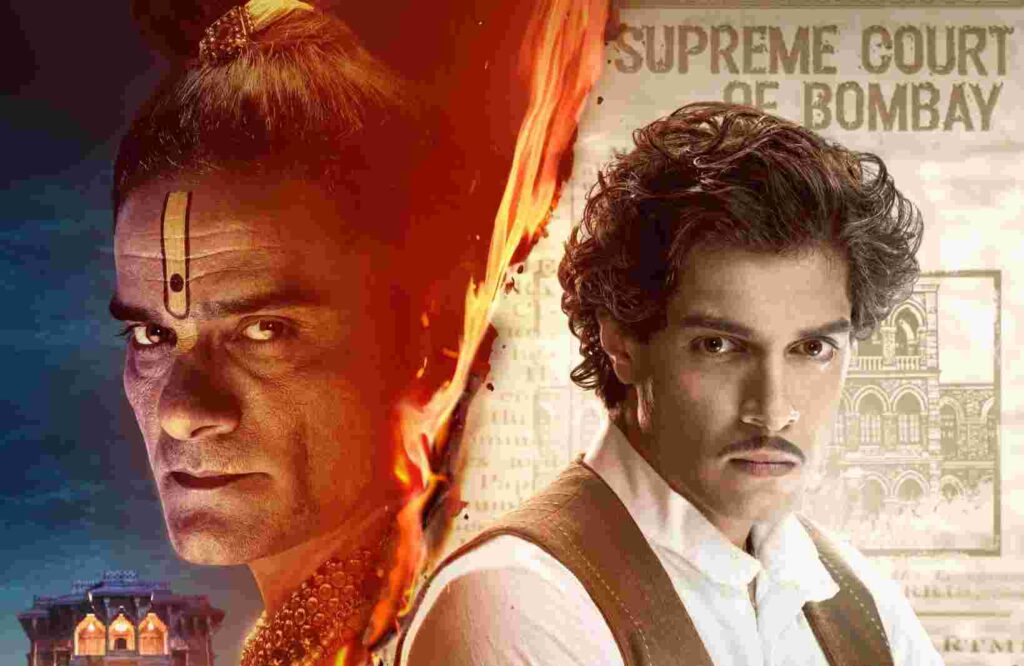Maharaj Movie Review: “Maharaj” is adapted from Saurabh Shah’s 2013 Gujarati novel and directed by Karan P Malhotra.

It’s a unique distinction for any film to echo the fate of its subject. In the 1860s, journalist and social reformer Karsandas Mulji faced legal action for an article exposing the sexual misconduct of a powerful religious leader.
Over 150 years later, a Netflix film titled “Maharaj”—which chronicles Karsandas’s life and stars Junaid Khan, Aamir Khan’s son, in his debut role—experienced a temporary release suspension due to a petition by a religious sect. On June 21, the Gujarat High Court lifted the stay, stating, “Having viewed the film, this court found nothing objectionable that would hurt the religious feelings of petitioners or a sect.”
Also Read:- Border 2: Sunny Deol returns as Fauji after 27 years; Watch
Maharaj Movie Review
“Maharaj” is adapted from Saurabh Shah’s 2013 Gujarati novel and directed by Karan P Malhotra. It dramatizes the 1862 Maharaj libel case, a significant legal battle where British colonial judges mediated between religious conservatism and progressive reform. The defamation suit, filed by Jadunathji, a high priest of the Pushtimarga sect, against Karsandas, was held in the Supreme Court of Bombay. Karsandas, the editor of the Gujarati weekly Satyaprakash, won the case but found the reward insufficient to cover his trial expenses.
Interestingly, Malhotra reserves the courtroom drama for the film’s climax, opting instead to focus on the ongoing conflict between Karsandas (Junaid Khan) and Jadunath (Jaideep Ahlawat), known as JJ. JJ, a charismatic and manipulative figure, exploits his female devotees sexually. While most people are entranced by JJ, Karsandas—a believer and Vaishnavite—remains skeptical, questioning the superstitious practices of his faith.
Karsandas is portrayed as a virtuous figure challenging conservative norms, advocating for widow remarriage, and defying caste barriers. His motivation to expose JJ’s misdeeds becomes deeply personal when his fiancée, Kishori (Shalini Pandey), a victim of JJ’s abuse, commits suicide after Karsan ends their engagement. This personal loss propels Karsan into action, realizing his mistake in prioritizing “honor” over giving Kishori a chance to liberate herself. Karsan’s transformation from a traditional protector to a progressive crusader is underscored by his partnership with Viraaj (Sharvari Wagh), who joins him in his fight against JJ.
Set against the backdrop of 19th-century Bombay, described as “more a concept than a city,” the film delves into the era’s conflicting ideologies. It contrasts the modernizing efforts of reformers like Karsandas and Dadabhai Naoroji with the wealth and influence of religious leaders like JJ. The production design, though somewhat theatrical, is visually appealing, complemented by Rajeev Ravi’s painterly cinematography.
The film highlights JJ’s oppressive control over his community, showcasing the dangers of blind faith and personality cults while also portraying religion’s unifying aspects. When JJ restricts temple access to force an apology from Karsandas, Karsan responds by leading an aarti under a peepal tree, symbolizing resilience and faith. The film later draws a parallel to the Janmashtami story with a midnight rescue of a pregnant couple.
Also Read:- Munjya Movie Review: A Promising Start That Fizzles into Mediocrity
Junaid Khan’s portrayal of Karsandas is sincere, though he lacks the compelling presence needed for a leading man, especially in the courtroom scenes. Jaideep Ahlawat delivers a masterful performance as JJ, exuding calm malevolence. The supporting cast, including Sharvari Wagh and Jay Upadhyay, also contribute significantly to the film.
Earlier this year, the Tamil film “Annapoorani” was removed from Netflix due to right-wing backlash. “Maharaj,” despite being a straightforward and self-congratulatory film, could have gone unnoticed if not for the current climate of sensitivity.
The cautious release of this film by Netflix, without much promotion, reflects the delicate balance streaming platforms must maintain. The film’s message about progress being non-linear is apt, given the challenges it faced.
“Maharaj” is now available on Netflix.
